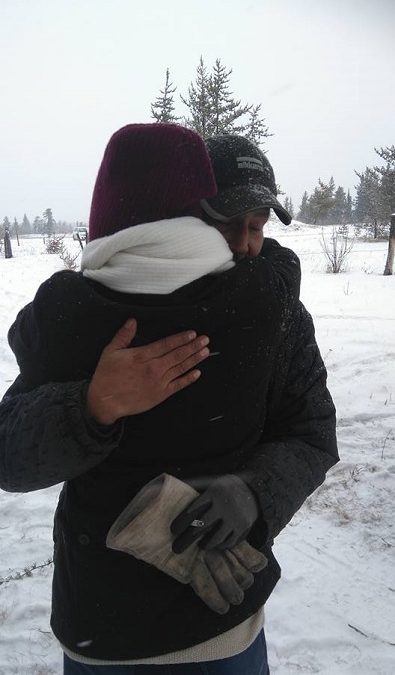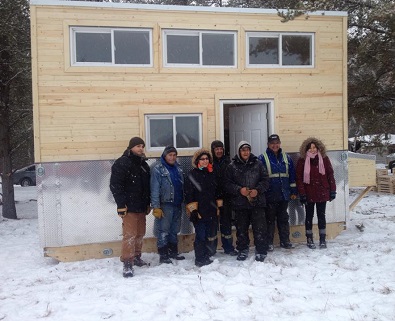Allan shares a emotional hug with his kids as they arrive on the day of the delivery. Photo courtesy One House Many Nations, Facebook.
Idle No More’s campaign to improve housing on reserve just changed a Big River First Nation man’s life.
Within three months, Idle No More’s founders developed One House Many Nations Campaign, started collecting donations and laid the groundwork to provide affordable housing for people on reserve.
In December, they teamed up with Winnipeg-based company, Mini Homes of Manitoba, to build a teeny self-sustaining house.
It took three weeks for the company’s co-owners, Anita Munn and Darrell Manuliak, and a group of volunteers to build the home, and on Wednesday they delivered the home to a family on Big River First Nation.
Allan – whose last name hasn’t been shared – had been homeless for 15 years, which made visits with his children very difficult, said Idle No More founder Sylvia McAdam.
While Munn drove in a convoy from Winnipeg to Big River, McAdam was at Big River to help Allan prepare for the delivery.
The arrival was an emotional one filled with hugs, but also logistics as the team of volunteers maneuvered the home into its final spot, leveled the land, and set up solar panels. The house is self-sustaining, with a wood stove that generates electricity as well.
The group stands together with the mini home. Photo courtesy One House Many Nations, Facebook.
Munn said when Idle No More approached her company for the project, she didn’t hesitate to get involved.
“What we’re doing, in a way, is the same thing that they’re doing with their “One House Many Nations” is screaming out to government that there needs to be accountability and that affordable housing should be something that is accessible to everybody,” she said.
They want the government to see that housing – big or small – is a necessity for Canada’s indigenous people, and not everybody needs to live in a “McMansion.”
“The fact that there are people in our country living in such inhumane conditions, it’s heartbreaking. But for us to be able to, not only as a young business, but as humans, to be able to say ‘here’s a home,’ I don’t think there’s anything bigger I can accomplish in my life,” Munn said.
For Munn, the long construction days that left “our bodies screaming ‘what have you done to me? You’re old!'” were worth it to be doing something that empowers people.
She pointed out that the build was almost entirely done by women, with the exception of her partner, Manuliak.
“It’s the most wonderful feeling in the world… for us to be able to teach our girls that building is not just a man’s world. You know, their mom can run the chop saw like nobody’s business,” she said.
Aside from the personal fulfillment, Munn said this project truly did change one man’s life.
During the transport, she noted that “in a few hours we’re going to be watching this man walk into a house, a home – something that most of us take for granted every single day. That you know, hey I can just brush my teeth in my bathroom, I can just sit down on my couch and curl up and read a book.”
She noted that in less than a month it took only two people, a handful of volunteers, and many generous donations to build the first mini home under Idle No More’s campaign.
Munn said getting the house out to its new owner was their first goal with Idle No more’s campaign, but they’re more than willing to continue working with them.
More than 300 people have donated to the current campaign, whether through their time or their money.
The One House Many Nations Campaign will continue with an overall goal to bring awareness, and provide solutions, to the housing inequity on reserve.
To donate, follow this link.

